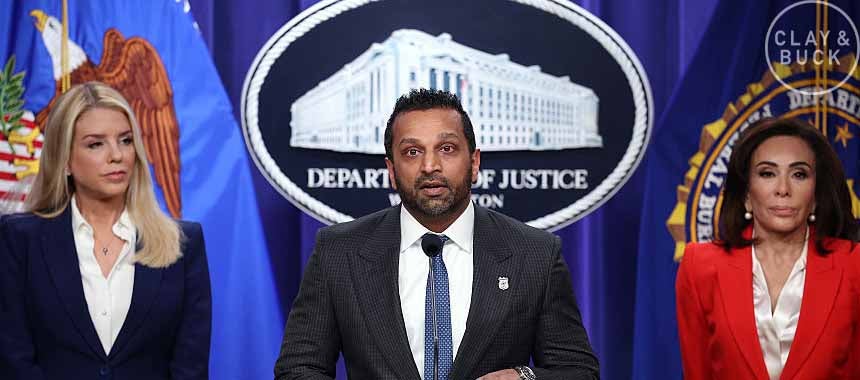Our Favorite Election Nerd Ryan Girdusky Breaks Down the Key Races
27 Oct 2022
CLAY: One of our favorite congressional and Senate nerds. And I say that very affectionately, Ryan Girdusky, as we sit here 11 days out, has voluminous knowledge of basically all the races that are going on all over the country in the House of Representatives and also obviously in the Senate. So, Ryan, I’m going to start with a big broad question for you, and thanks for making the time for us. How many Republican seats in the House do you think the over/under on pick up is on the big map that you kind of pay attention to? And what do you expect to see in the Senate? How would you assess us 11 days out over/under where we’re headed?
GIRDUSKY: So, I wrote a piece for my Substack, the National Populist Newsletter, which you can get on Substack and I basically broke down the entire House and Senate races. And what I think is Republicans are looking at between 225 seats on the low end and about 249 seats on the high end. My estimate would be about 239 Republican House victory seats going into the the election in 11 days.
 And in the Senate, I would say there’s a lot of seats literally on a 50-50 coin toss, specifically the big four, Arizona, Nevada, Pennsylvania and Georgia. Momentum is in the favor of Republicans in three of those states in Arizona, in Georgia and in Pennsylvania, Republicans have a lot of wind in their sails. Nevada is a very difficult state. It’s one of the very few states in the union that typically Republicans poll better than they vote on Election Day. It is also the only state in the union where people can go to the ballot and vote for none of the above. Which 4 or 5% of the public do. They get out of their beds, they get on their houses, they go vote and they vote for none of the above. Very special kind of people in Nevada.
And in the Senate, I would say there’s a lot of seats literally on a 50-50 coin toss, specifically the big four, Arizona, Nevada, Pennsylvania and Georgia. Momentum is in the favor of Republicans in three of those states in Arizona, in Georgia and in Pennsylvania, Republicans have a lot of wind in their sails. Nevada is a very difficult state. It’s one of the very few states in the union that typically Republicans poll better than they vote on Election Day. It is also the only state in the union where people can go to the ballot and vote for none of the above. Which 4 or 5% of the public do. They get out of their beds, they get on their houses, they go vote and they vote for none of the above. Very special kind of people in Nevada.
BUCK: I was going to say, what is the motivation of the none of the above voter? How does it go?
CLAY: They hate everyone.
GIRDUSKY: One time none of the above one, it was in a Democratic primary. So, I mean, like, you never know. There are people who go out and they do that. I don’t understand why, but they do so.
BUCK: Okay. So I got to ask you about a couple specific ones here, Ryan, Clay has very has been very confident. I gave him full credit all along in Herschel Walker’s ability to pull this off in the Senate in Georgia just this week. There’s more allegations that are coming out, Herschel saying they’re lies. They’re throwing everything they’ve got at him to try to make it a Warnock victory. What dynamics are playing out there right now based on the numbers?
GIRDUSKY: So, right now Georgia has I think it has to be over a million early votes are already in in the state of Georgia. So people have been voting for some time now. The big thing to look out for going into the election is the black turnout. Blacks vote 90 to 95% for the Democratic Party in every election, with the exception of very, very few. And Herschel Walker will not break that trend, according to every poll there is to be found.
So, if 90% are voting for the Democratic Party, the big question is do they surpass 29%, which is what they had in 2020? As of right now, they’re at 30.7%. They start off very, very high. A sugar high of 38% of the vote was the black vote and is falling every single day. The last two days in a row, it’s been 26%. So where that ultimately falls is a big question.
The second big question is how much does Kemp do better than Walker in the collar counties outside of Atlanta? And that is the big question. There are many counties he’s not going to win, but he has to not be destroyed in them. So like Cobb County, Georgia, he needs to keep his loss under ten points, in Fulton County he needs to keep his lost under 40 points, in Gwinnett, under 15 points, in Newton, he’s got to either win or come within a few points. Henry County, less than 20 points. If they can keep those losses at a minimum, then the rural and exurban counties of Georgia will carry them both to victory.
Control of the Senate is tight, but looking at trends, polls, early voting habits and conversations with people on the ground, I made a prediction on every Senate race https://t.co/9FGYN9NXmc
— Ryan James Girdusky (@RyanGirdusky) October 26, 2022
CLAY: So, it’s really kind of fascinating, as you look at some of these tight races. And I want to beat this drum because I, Ryan, I bet you’ll agree with me here. There are a lot of people who are going to vote Libertarian that would otherwise vote Republican and just those Libertarian voters could swing the outcome in the Senate, right? So, if you’re in Nevada, if you’re in Pennsylvania, if you’re in Georgia, Arizona, you’re in Arizona and you’re voting Libertarian, you may well cost Republicans the Senate, maybe trade with somebody in California or New York or some state where it’s actually not going to be close.
GIRDUSKY: Well, there’s no Libertarian on the ballot in New York. So, it’s always the important states to actually have these Libertarians on the ballot. Yeah, I agree it is. I mean, and they have Libertarians. I mean, the Libertarians in mid 2010, they cost us the governor’s seat and Senate seat and it was the same guy who cost us both, both in Virginia for Ken Cuccinelli in 2013 and then the following year in 2014, the same guy cost the Republicans both seats.
I have never voted Libertarian, so I can’t, I’m not espousing, I don’t understand the beliefs to sit there and do that. The guy running in Arizona against against Kelly and and the Republican is advocating for changing the consent laws, that’s his main issue is changing sexual consent laws. So, if that’s your main issue, I guess you have a candidate. But I don’t understand some voting against somebody like Blake Masters who votes, who presumes 90% on every issue is a fairly libertarian guy.
BUCK: Can you tell us what’s the situation in Arizona right now for Masters versus Kelly?
GIRDUSKY: Well, Masters, well, they’re both under 50% in the polls. But Blake Masters has been tied to Kari Lake. Kari Lake is surging in the polls. She is very lucky to have run against one of the worst Democrats in the entire country, Katie Hobbs. But Arizona is a very fast changing state. A lot of Hispanics live there, a lot of retirees that may be leaning or Democrat, a lot of California refugees live there now and they bring their politics with them.
BUCK: And the Hispanic wave that we had seen some early indicators of going for GOP in unprecedented numbers in some of these races, is that manifesting? Is that actually happening based on the early voting places like Arizona, Nevada, for example?
If we wake up on November 9th or late December to a 53-47 Republican majority, the chances of a filibuster proof 60 or 61 seat majority in 2025 with a Republican House and Presidency becomes very very real https://t.co/U3LLT9qCu2
— Ryan James Girdusky (@RyanGirdusky) October 27, 2022
GIRDUSKY: Yeah, but but here’s the thing, is that Hispanics are not a monolithic group. So, yeah, they could be surging in places like Orange County, Florida, which is a very heavily Puerto Rican community, and there are a lot of signs saying Republican voters among Hispanics is surging. They could be surging in the fajita belt of South Texas, those three congressional districts which are Tejanos Mexican. That doesn’t mean they’re going to be surging everywhere at the same place all the time.
So, what’s going to happen is even if it’s a wave election, that does not mean Republicans will do better in every single district. It ebbs and flows. And that was the truth of Democrats in 2018 or Republicans in 2010. There are places they outperform 2020. When the Republican, when the Hispanic vote broke so heavily for Trump, two of the areas they did not break as heavily for, one of the areas was Arizona. Arizona Hispanics did not break as heavily for Trump as they did in other places.
So, it’s something to sit there and see. It’s something that’s out there and see the three big demographics of Arizona that will really decide this election or if the Hispanic turnout is moving towards Republicans, if the Mormons, who hated Donald Trump and voted heavily against him, come home to the Republican Party. And if retirees — Blake Masters just said he wanted to privatize Social Security if they hold that against him, those are the big three that I think will decide in the suburbs of Phoenix and and Scottsdale and all the rest of it.
CLAY: All right, Ryan, I’m a super optimist. I think that this is going to be a Red Wave that could border on a Red Tsunami.
GIRDUSKY: It shows that you’re not from New York. Go ahead.
CLAY: So, Ryan, Election Night, you know everybody’s going to be gathered around watching early returns. Where would you say would be bellwether races to look at…
GIRDUSKY: I’m so glad you asked that.
CLAY: On the East Coast have that as the races start to come in that would give us an idea.
 GIRDUSKY: This is my new post on National Populist Newsletter on my Substack. So, 7:00 actually polls are closing at 6, but 7:00 polls close in two big states, not two big states, but two states, Indiana and Kentucky. Kentucky has no swing districts in them. Indiana has one, and that is Indiana’s first congressional district. It is a historically Democratic county district. It is in the suburbs of Chicago. It is a large black vote. We have a female black Republican veteran running against a white guy in that district, a white Democrat in that district. The district is an open seat. Republicans have put a lot of money and energy, in the seat that moved substantially toward Trump. It is a mixture of Rust Belt voters and suburban white voters. What reflects there could reflect in parts of Michigan, in other congressional districts, in Illinois and in Wisconsin. So, it’s a very important seat just a look at. Republicans aren’t expected to win, but if they can get within ten points, it’s very important.
GIRDUSKY: This is my new post on National Populist Newsletter on my Substack. So, 7:00 actually polls are closing at 6, but 7:00 polls close in two big states, not two big states, but two states, Indiana and Kentucky. Kentucky has no swing districts in them. Indiana has one, and that is Indiana’s first congressional district. It is a historically Democratic county district. It is in the suburbs of Chicago. It is a large black vote. We have a female black Republican veteran running against a white guy in that district, a white Democrat in that district. The district is an open seat. Republicans have put a lot of money and energy, in the seat that moved substantially toward Trump. It is a mixture of Rust Belt voters and suburban white voters. What reflects there could reflect in parts of Michigan, in other congressional districts, in Illinois and in Wisconsin. So, it’s a very important seat just a look at. Republicans aren’t expected to win, but if they can get within ten points, it’s very important.
CLAY: That Indiana-1. That’s Indiana-1, you said?
GIRDUSKY: And the other two seats that are very important when polls close Virginia-7 and Virginia-2. Virginia 2nd is Virginia Beach, Virginia 7th is like the Richmond suburbs of like north central Virginia. Two Democrats who are rising stars within the party are fighting for their lives in both seats and Republicans have invested very, very heavily in both those districts. If Republicans win both, it is an absolute Red Wave. It is going to be balls to the walls, a mass sweep across the country if they lose both. It is really questionable how high the Republican majority gets to. The districts are more likely to win as the 2nd, the less likely win the 7th. But who knows? But nonetheless, those are the two big ones that they have to win. Then as you go to the 7:30 hour, more states close. Also, Florida closes at that point, too, in Florida, you should check out like certain counties and how DeSantis is performing in them.
BUCK: Clay has a quick one for you, then I have a question for you. Then we got to go. Clay, go ahead.
CLAY: No, Ryan, I was just going to comment. I was going to say, if you want to seem really smart at your election party, you drop that Virginia-2 and Virginia-7 knowledge. And if you have a Clay and Buck listener, that isn’t in that house, they’re going to be like, man, you’re really a genius. I was just going to toss that in as well.
Looks like they have internals back https://t.co/U04baDLNrq
— Ryan James Girdusky (@RyanGirdusky) October 27, 2022
BUCK: That’s why people should subscribe to Ryan’s Substack The National Populist Newsletter. Ryan, you don’t even have to give me much analysis on it or anything. Just is my man Lee Zeldin going to win the New York governor’s race?
GIRDUSKY: I really believe so. And I’ve said this over and over.
BUCK: Yes!
GIRDUSKY: I know I sound crazy, but I do feel it. Yesterday there was an event near near where I grew up in Queens County, where it was like a 40 South East Asian business owners who were Democrat donors, who endorsed Zeldin. And they’re putting signs in 250 gas stations across the state of New York. I have to believe that there’s some momentum. I mean, it is the last chance to save the state. And I think that the demographic changes with voting patterns among Asians, Southeast Asians, Orthodox Jews and and Hispanics are going to be enough to sit there and put them over the edge. I really hope so.
BUCK: All right, Ryan, thanks so much, man. Always so illuminating. Good to have you on the program. Thanks for being with us.
GIRDUSKY: Thank you.
Recent Stories

Katie Zacharia Previews the Funky California Gubernatorial Primary
Katie addresses the GOP's uphill battle to take back the state.

CAPTURED: Benghazi Attack Mastermind Arrested
America under Trump will hunt down anyone who kills Americans.

Mamdani Makes New York Ground Zero in the ICE Fight
Buck counsels the Trump administration to take the immigration battle to NYC.

VIP Video: With Benghazi Arrest, This Administration Nails It Again
Another big win for the Trump team.






